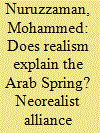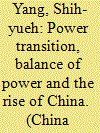| Srl | Item |
| 1 |
ID:
179857


|
|
|
|
|
| Summary/Abstract |
Dominant International Relations theories—realism/neorealism, liberalism/neoliberalism, and constructivism—have so far developed no rigorous theoretical attempts to interpret the Arab Spring, though some marginal efforts have been made to critique the failure of realism to interpret this historical development. This article presents a neorealist interpretation of the Arab Spring focusing on the Syrian civil war, where conflicts between the pro- and anti-status quo forces have unfolded in alignments and counter-alignments centering around rival domestic and external groups. To explain the involvements of rival alliances in the post-2011 Syrian conflict, namely, the United States–Saudi Arabia–Israel alliance and the Russia–Iran–Syria alliance, this analysis employs neorealist theories of alliance formation—the balance of power and balance of threat theories—as articulated by Kenneth Waltz and Stephen Walt, respectively. The dynamics of these formations in Syria lend more support to Walt’s theory that states balance against threats rather than against power. The complex nature and dynamics of the Syrian war, however, calls for refinements of Walt’s balance of threat theory. Accordingly, the article also explores various refinements of Walt’s theory to better explain future complex civil wars involving highly polarized domestic and external parties.
|
|
|
|
|
|
|
|
|
|
|
|
|
|
|
|
| 2 |
ID:
124277


|
|
|
|
|
| Publication |
2013.
|
| Summary/Abstract |
The rise of China is a major theme in international relations for both scholars and statesmen. Based on existing theories, namely the power transition theory and the balance of power theory, China's rise is forecasted to be violent, either by challenging the existing hegemon or by inviting counterbalancing efforts. Nonetheless, these arguments are highly controversial and lead to a neglect of theorization about rising great powers. Therefore, this article attempts to revisit and revive the theoretical discussions and present a refined theory of rising great powers that can explain the past and illuminate the future. to provide a clear picture of capabilities, the refined theory exclusively focuses on material variables. The theory demonstrates that the different material contexts in which great powers rise explain the differences in their external behaviors and how they are treated by existing great powers.
|
|
|
|
|
|
|
|
|
|
|
|
|
|
|
|
| 3 |
ID:
173806


|
|
|
|
|
| Summary/Abstract |
When and why might a rising China challenge the power and security of a relatively declining United States? Conventional wisdom argues that China – like other rising states – is apt to adopt an increasingly ambitious strategy that imperils US interests as its relative power grows. Drawing on balance of power theory, I instead argue that the threat of Chinese predation is overstated. Rising in a crowded geopolitical neighbourhood, China faces incentives to avoid preying on the United States, and may even have reason to cooperate with the United States over the long term.
|
|
|
|
|
|
|
|
|
|
|
|
|
|
|
|